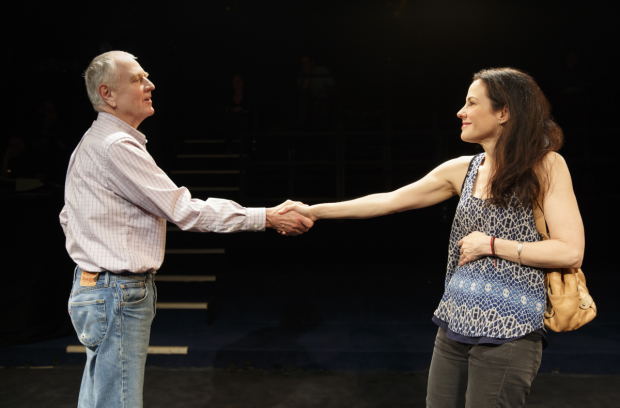Heisenberg

(© Joan Marcus)
"If you watch something closely enough you realize you have no possible way of telling where it's going or how fast it's getting there." Georgie Burns, the quirky protagonist of Stephen Simons' thoughtful two-hander Heisenberg played by the sublime Mary-Louise Parker, proffers this layman's-terms description of Werner Heisenberg's famous uncertainty principle. Georgie — a compulsive liar who talks in stream of consciousness and has a severe case of upspeak — is certainly no quantum physicist. But that doesn't keep her from taking solace in the possibility that everything from the finest atomic particles to the broadest human emotions operate under the same scientific mechanism — even if that mechanism is utter unpredictability.
In a genre overflowing with stories of fate and karmic predestination, Simons' unconventional yet thoroughly touching romance is a welcome kickoff to the new theater season (following a successful run for Stephens' Drama Desk Award-winning and Tony-nominated play The Curious Incident of the Dog in the Night-Time). Alex Priest (Denis Arndt), a 75-year-old Irish bachelor, is Georgie's unlikely counterpart during the 80-minute one-act at New York City Center's intimate Studio at Stage II. True, romantic comedies are known for capitalizing on improbable pairings where boy and girl wade through their superficial differences only to find their spirits are a cosmic match. But in Heisenberg, the bond between Georgie and Alex is never made out to be kismet. Their first encounter at a London train station is about as providential as two particles colliding in a petri dish. We get to tune in only after the event itself, but their relationship begins with Georgie's odd decision to kiss Alex — a complete stranger — on the back of the neck. There are no heavenly sunbeams or runaway Dalmatians guiding her way to him. Just a whim and the simultaneously thrilling and terrifying fact that every single moment in life is a product of an active choice.
Georgie immediately apologizes for her gall, though we get the sense that such erratic behavior is not too far outside her comfort zone. Wide-eyed, she starts down a rabbit hole of profanity-laden ramblings about her deceased husband, her yen for photography, and her career as a waitress (none of which turns out to be true) as she tries to guess her new unassuming companion's occupation ("I'm a butcher," he quietly shares).
A few days later, she tracks down Alex at his butcher shop, confessing to her lies and telling him of her estranged son in the hopes of fostering a relationship with this man she has suddenly and inexplicably set her sights on. Fortunately for her, Alex is easy to trace, for the few dots that make up his life story (a couple of which he shared at the train station) connect in predictable patterns and make for simple research. He's gone nowhere, done nothing, and met no one outside his butcher shop and daily walking route, which has not changed in decades. His most eccentric qualities are his unpredictable sobbing fits and his regular conversations with the ghost of his sister, who died in childhood. Beyond that, his life is governed by routine — something Georgie, with her Heisenberg philosophizing, sets out to subvert with or without Alex's consent.
The characters' 33-year age difference (a 26-year gap for the actors in real life) is admittedly jarring, as it should be. After all, according to pop culture, love and romance are only for the young, virile, and visually well-matched. Stephens' play, directed with noticeable seams by Mark Brokaw, confronts these latent assumptions with a bare-bones production, designed by Mark Wendland. Parker and Arndt fashion a restaurant table, a bed, and several other pieces of furniture out of two rectangular tables and a pair of chairs that they shuffle around the floor between scenes. Michael Krass' costumes (a simple tank and cropped pants for her — a button-up and jeans for him) never change, no matter the setting. It's a production absent all shock absorbers and Brokaw and his two stellar actors sink wholly into its unsteady ground, Parker and Arndt even sharing a playful and unabashedly intimate bedroom scene.
It would be a lie to say the age difference is ever forgotten. But Arndt, who is effortless with his character's easygoing Irish manner and soft-spoken charm, makes a strong case for the unconventional relationship. Eyes deadened by years of dormancy take on a subtle spark in Wilson's presence, justifying his sudden willingness to invite this whirling dervish into his comfortably predictable life. Parker's character goes beyond manic pixie dreamgirl with her peculiarities, veering closer to "annoying" than "charming" on the scale of eccentricity. And yet, we still root for the pair of newly acquainted lovers, while cheering Stephens for reimagining the tired genre of carpe diem-spouting romance. The most predictable species in the theatrical jungle has officially gotten the Heisenberg treatment, and is better off for it.











